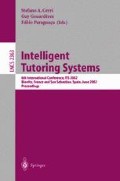Abstract
The ability to detect the students’ motivational state during an instructional interaction can bring many benefits to the performance of an Intelligent Tutoring System (ITS). In this paper we present an empirical study which provided us with a considerable amount of knowledge regarding motivation diagnosis. We show how this knowledge was formalised in order to create a set of motivation diagnosis rules that can be incorporated into a prototype tutoring system. We also briefly present how these motivation diagnosis rules were evaluated in another study.
Access this chapter
Tax calculation will be finalised at checkout
Purchases are for personal use only
Preview
Unable to display preview. Download preview PDF.
References
Flora Davis. La Comunicación No Verbal, volume 616 of El Libro de Bolsillo. Alianza Editorial, Madrid, Spain, 1976. Translated by Lita Mourglier from: “Inside Intuition-What we Knew About Non-Verbal Communication”; McGraw-Hill Book Company, New York.
Angel de Vicente and Helen Pain. Motivation diagnosis in intelligent tutoring systems. In Barry P. Goettl, Henry M. Halff, Carol L. Redfield, and Valerie J. Shute, editors, Proceedings of the Fourth International Conference on ITS, pages 86–95, Berlin, 1998. Springer.
Angel de Vicente and Helen Pain. Motivation self-report in ITS. In Susanne P. Lajoie and Martial Vivet, editors, Proceedings of the Ninth World Conference on Artificial Intelligence in Education, pages 648–650, Amsterdam, 1999. IOS Press.
Teresa del Soldato. Motivation in Tutoring Systems. PhD thesis, School of Cognitive and Computing Sciences, The University of Sussex, UK, 1994. Available as Technical Report CSRP 303.
Kim Issroff. Investigating Computer-supported Collaborative Learning from an Affective Perspective. PhD Thesis, Institute of Educational Technology, The Open University, 1996.
John M. Keller. Motivational design of instruction. In Charles M. Reigeluth, editor, Instructional-design Theories and Models: an Overview of their Current Status, pages 383–434. Lawrence Erlbaum Associates, Hillsdale, New Jersey, 1983.
Mark R. Lepper and Thomas W. Malone. Intrinsic motivation and instructional effectiveness in computer-based education. In Marshall J. Farr, editors. Conative and Affective Process Analyses, volume 3 of Aptitude, Learning, and Instruction. Lawrence Erlbaum Associates, Inc., Hillsdale, New Jersey, 1987. Snow and Farr [12], chapter 11, pages 255–286.
Thomas W. Malone and Mark R. Lepper. Making learning fun: A taxonomy of intrinsic motivations for learning. In Marshall J. Farr, editors. Conative and Affective Process Analyses, volume 3 of Aptitude, Learning, and Instruction. Lawrence Erlbaum Associates, Inc., Hillsdale, New Jersey, 1987. Snow and Farr [12], chapter 10, pages 223–253.
Yukihiro Matsubara and Mitsuo Nagamachi. Motivation system and human model for intelligent tutoring. In Claude Frasson, Gilles Gauthier, and Alan Lesgold, editors, Proceedings of the Third International Conference on ITSs, pages 139–147, Berlin, 1996. Springer-Verlag.
Nathalie Person, Bianca Klettke, Kristen Link, and Roger Kreuz. The integration of affective responses into AutoTutor. In International Workshop on Affect in Interactions. Towards a New Generation of Interfaces (Annual Conference of the EC I3 Programme), October 1999.
Byron Reeves and Clifford Ivar Nass. The Media Equation: How People Treat Computers, Television and New Media Like Real People and Places. Centre for the Study of Language and Information, US, New York, 1998.
Richard E. Snow and Marshall J. Farr, editors. Conative and Affective Process Analyses, volume 3 of Aptitude, Learning, and Instruction. Lawrence Erlbaum Associates, Inc., Hillsdale, New Jersey, 1987.
Author information
Authors and Affiliations
Editor information
Editors and Affiliations
Rights and permissions
Copyright information
© 2002 Springer-Verlag Berlin Heidelberg
About this paper
Cite this paper
de Vicente, A., Pain, H. (2002). Informing the Detection of the Students’ Motivational State: An Empirical Study. In: Cerri, S.A., Gouardères, G., Paraguaçu, F. (eds) Intelligent Tutoring Systems. ITS 2002. Lecture Notes in Computer Science, vol 2363. Springer, Berlin, Heidelberg. https://doi.org/10.1007/3-540-47987-2_93
Download citation
DOI: https://doi.org/10.1007/3-540-47987-2_93
Published:
Publisher Name: Springer, Berlin, Heidelberg
Print ISBN: 978-3-540-43750-5
Online ISBN: 978-3-540-47987-1
eBook Packages: Springer Book Archive

